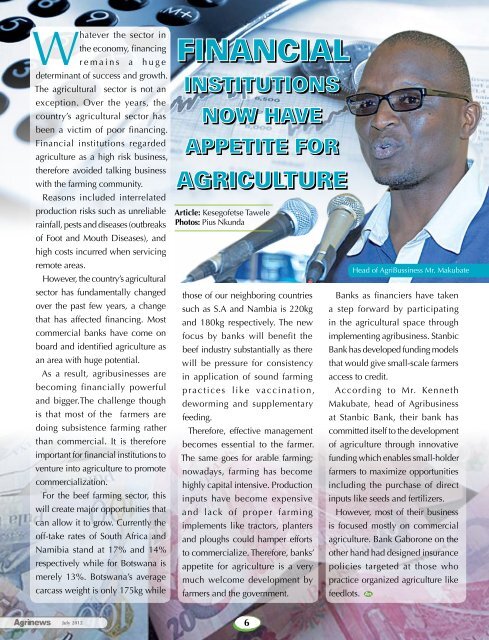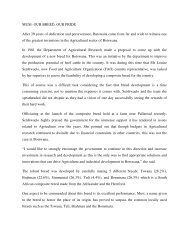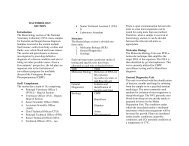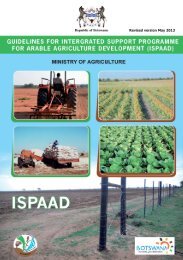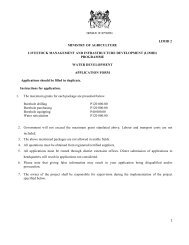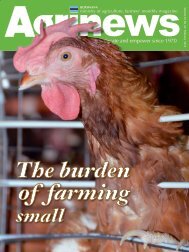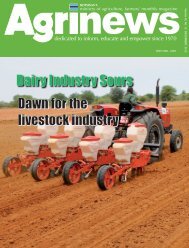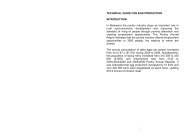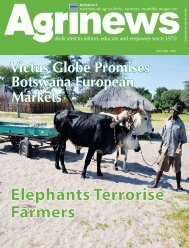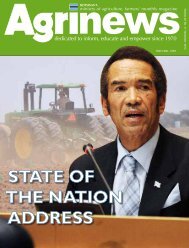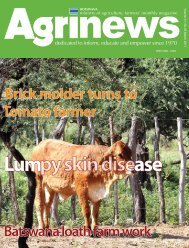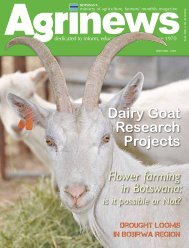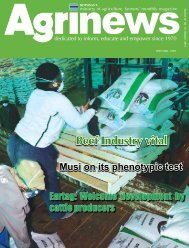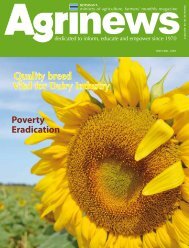GHANZI SHOW - Ministry of Agriculture
GHANZI SHOW - Ministry of Agriculture
GHANZI SHOW - Ministry of Agriculture
Create successful ePaper yourself
Turn your PDF publications into a flip-book with our unique Google optimized e-Paper software.
Whatever the sector in<br />
the economy, financing<br />
r e m a i n s a h u g e<br />
determinant <strong>of</strong> success and growth.<br />
The agricultural sector is not an<br />
exception. Over the years, the<br />
country’s agricultural sector has<br />
been a victim <strong>of</strong> poor financing.<br />
Financial institutions regarded<br />
agriculture as a high risk business,<br />
therefore avoided talking business<br />
with the farming community.<br />
Reasons included interrelated<br />
production risks such as unreliable<br />
rainfall, pests and diseases (outbreaks<br />
<strong>of</strong> Foot and Mouth Diseases), and<br />
high costs incurred when servicing<br />
remote areas.<br />
However, the country’s agricultural<br />
sector has fundamentally changed<br />
over the past few years, a change<br />
that has affected financing. Most<br />
commercial banks have come on<br />
board and identified agriculture as<br />
an area with huge potential.<br />
As a result, agribusinesses are<br />
becoming financially powerful<br />
and bigger.The challenge though<br />
is that most <strong>of</strong> the farmers are<br />
doing subsistence farming rather<br />
than commercial. It is therefore<br />
important for financial institutions to<br />
venture into agriculture to promote<br />
commercialization.<br />
For the beef farming sector, this<br />
will create major opportunities that<br />
can allow it to grow. Currently the<br />
<strong>of</strong>f-take rates <strong>of</strong> South Africa and<br />
Namibia stand at 17% and 14%<br />
respectively while for Botswana is<br />
merely 13%. Botswana’s average<br />
carcass weight is only 175kg while<br />
those <strong>of</strong> our neighboring countries<br />
such as S.A and Nambia is 220kg<br />
and 180kg respectively. The new<br />
focus by banks will benefit the<br />
beef industry substantially as there<br />
will be pressure for consistency<br />
in application <strong>of</strong> sound farming<br />
practices like vaccination,<br />
deworming and supplementary<br />
feeding.<br />
Therefore, effective management<br />
becomes essential to the farmer.<br />
The same goes for arable farming;<br />
nowadays, farming has become<br />
highly capital intensive. Production<br />
inputs have become expensive<br />
and lack <strong>of</strong> proper farming<br />
implements like tractors, planters<br />
and ploughs could hamper efforts<br />
to commercialize. Therefore, banks’<br />
appetite for agriculture is a very<br />
much welcome development by<br />
farmers and the government.<br />
Banks as financiers have taken<br />
a step forward by participating<br />
in the agricultural space through<br />
implementing agribusiness. Stanbic<br />
Bank has developed funding models<br />
that would give small-scale farmers<br />
access to credit.<br />
According to Mr. Kenneth<br />
Makubate, head <strong>of</strong> Agribusiness<br />
at Stanbic Bank, their bank has<br />
committed itself to the development<br />
<strong>of</strong> agriculture through innovative<br />
funding which enables small-holder<br />
farmers to maximize opportunities<br />
including the purchase <strong>of</strong> direct<br />
inputs like seeds and fertilizers.<br />
However, most <strong>of</strong> their business<br />
is focused mostly on commercial<br />
agriculture. Bank Gaborone on the<br />
other hand had designed insurance<br />
policies targeted at those who<br />
practice organized agriculture like<br />
feedlots.<br />
July 2012 6


